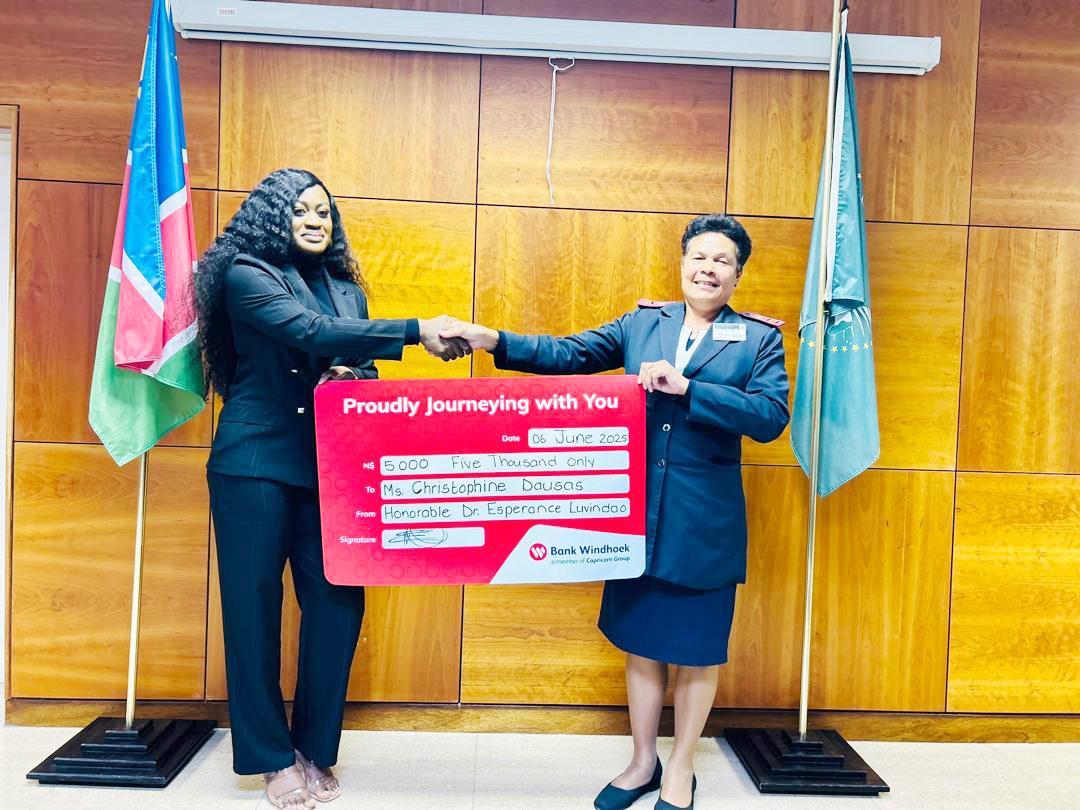Africa-Press – Namibia. When you meet Christophine Dauses, her calm presence and warm smile give little away about the emotional weight she carries every day.
She is the chief registered nurse at the Mental Health Care Centre at the Windhoek Central Hospital.
Dauses works in one of the most demanding yet rewarding areas of healthcare.
She cares for people living with mental health conditions.
Every morning, she puts on her uniform, walks into the Mental Health Care Centre and is ready to meet whatever challenges the day brings.
For Dauses, “every day is another chance to make a difference”.
What drives her is not just the responsibility of her role, but the purpose it gives her life.
“Being part of a system that strives to provide equitable healthcare to all Namibians, regardless of their background or income, gives my work a deeper sense of meaning. I’m not just doing a job. I’m contributing to the well-being of my community and country,” she asserted.
Dauses sees herself not only as a healthcare provider but as a partner in her patients’ journeys toward recovery and dignity.
She admitted that her work is not easy.
There will always be new challenges, fresh crises, and moments of uncertainty.
But for Dauses, that is the nature of the calling she answered decades ago.
“If I can help even one person feel valued, respected and hopeful again, then it has been a good day,” she said softly.
Humble beginning
Born and raised in Gobabis, in Namibia’s Omaheke region, Dauses’ early life was grounded in community values and the importance of caring for others.
She attended primary and junior secondary school in her hometown before moving to the South to complete grade 12 at Petrus ’Ganeb Secondary School.
Her passion for healthcare became clear during her teenage years.
“Even in school, I was drawn to helping people. Whether it was classmates or neighbours, I always wanted to assist – to make someone’s day a little easier,” she recalled.
That passion eventually led her to the University of Namibia, where she enrolled for a Diploma in Nursing Science.
She graduated in 1996.
University life was not only about academics. She was also a competitive athlete, running in the 100 metres (m), 200m and 4x100m relay events.
Before joining public service, Dauses spent years working in private hospitals, gaining experience across different wards and patient care settings.
In March 2022, she made a life-changing decision to join the health ministry as a chief registered nurse at the Mental Health Care Centre at Windhoek Central Hospital.
“I wanted to serve where I am needed most – and that’s to help vulnerable communities, promote equity in healthcare, and contribute meaningfully to Namibia’s national development, especially in mental health,” she said.
Responsibilities
Dauses’ daily responsibilities entail assessing and monitoring patients, building trust through therapeutic communication, managing medications, planning and coordinating care, intervening in crises, educating and supporting patients’ families, advocating for patients’ rights and dignity, and maintaining accurate documentation in line with legal requirements.
But behind the list of duties lies human reality. “Each patient comes with a story. Some are marked by trauma, and others by lifelong struggles with illness. Some require immediate crisis intervention, while others need long-term support and rehabilitation,” she shared.
Dauses maintained: “Each day presents new challenges – whether it’s supporting someone through an emotional crisis, managing co-existing mental and physical health conditions, or helping families understand and cope with their loved one’s experiences. Every person we help to regain their dignity, confidence or independence is a quiet victory”.
Demands and rewards
Working in mental health care is emotionally demanding.
There are days when challenges feel overwhelming, and patient progress can be slow.
But for Dauses, the small victories are worth every ounce of effort.
“It’s not always about dramatic recoveries. Sometimes, it’s about a patient smiling again after weeks of sadness, or a family finally understanding that their loved one’s condition is not their fault. Those moments stay with you,” she reflected.
Her work requires balancing clinical knowledge with deep empathy.
“You have to remain strong but also human. People in a crisis need to feel heard, understood and respected,” she remarked.
Memories
One of the highlights of Dauses’ career came when she was honoured with the Best Nurse Manager Award.
The award was presented by the chief control registered nurse, Claudia Kambonde.
It included a N$5 000 monetary prize from the Honourable health minister, Dr Esperance Luvindao.
“It wasn’t just about the award. It was about the recognition and knowing that my efforts were making a real difference,” she said.
When asked her views on the perception that civil servants are slow or inefficient, Dauses had this to say: “This view is misleading and unfair. In public health, nurses, doctors and support staff work long hours, often under challenging conditions, to ensure services reach even the most remote communities. While no system is perfect, many of us serve with integrity, compassion and responsibility”.
Dauses believes the dedication of public health professionals is often overlooked, particularly when they work quietly behind the scenes without fanfare.
Aspirations
Dauses is committed to staying in the public service until her retirement and possibly beyond if her health permits.
Her goals for the years ahead include strengthening mental health services in Namibia, continuing her professional growth in nursing and healthcare leadership, and maintaining personal health, balance and strong relationships outside of work.
She remains especially passionate about mental health advocacy, believing that Namibia still has a long journey ahead in breaking down stigma and ensuring access to care for all.
For More News And Analysis About Namibia Follow Africa-Press






